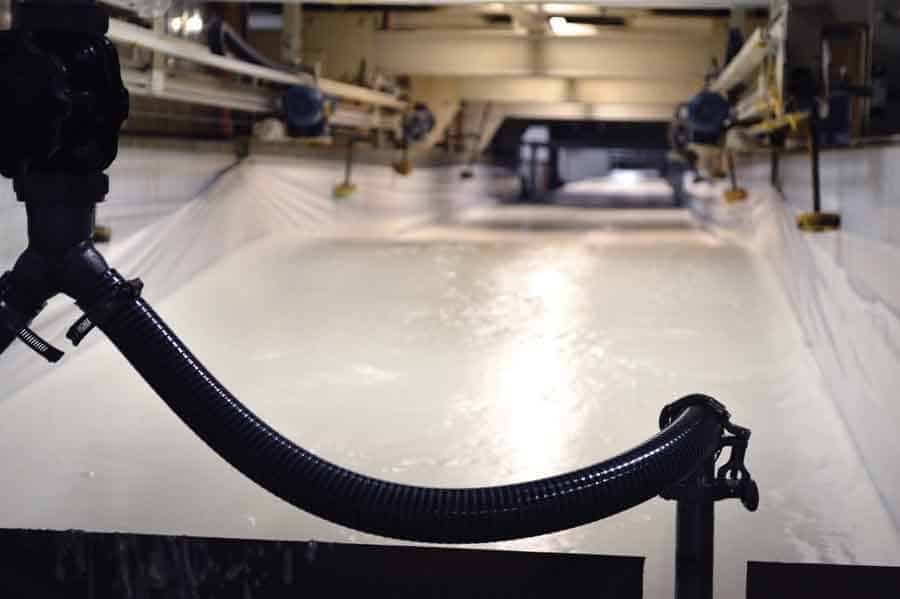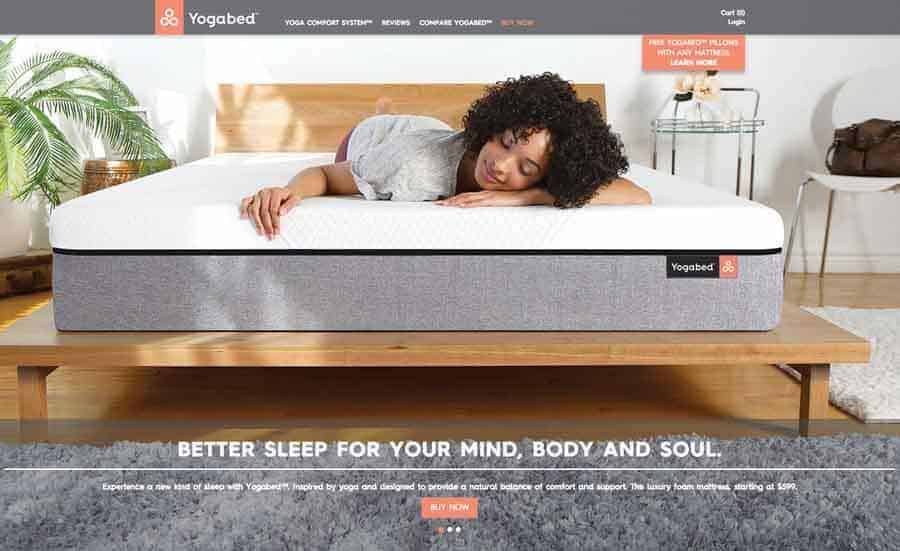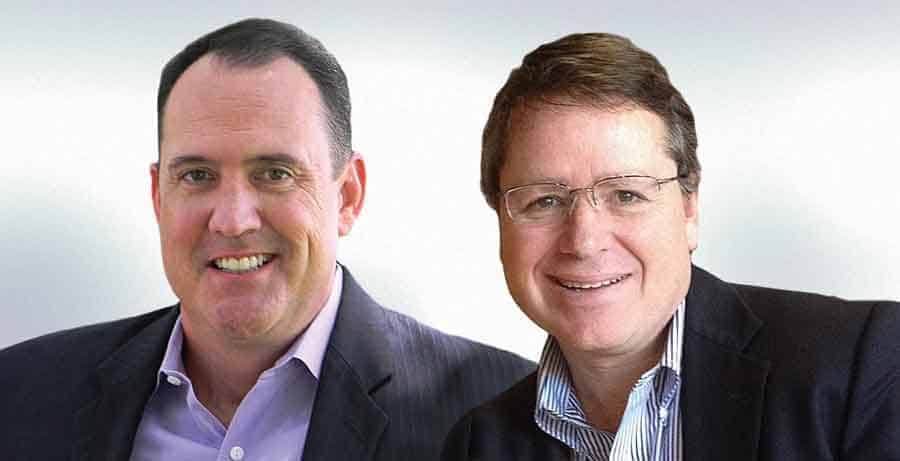Online mattress retailer bends traditional manufacturing and selling methods to reach today’s shoppers
BY DOROTHY WHITCOMB
Just eight months old, Yogabed is one of the latest entries into the mattress industry’s rapidly expanding consumer-direct category. Although the online company is young, its founders have positioned it for growth and longevity. They are convinced that Yogabed and companies like it are at the vanguard of a revolution that will change the face of the industry. By offering consumers more choices of how and when to buy beds and by helping them make better purchasing decisions, consumer-direct companies, they believe, will ultimately simplify the buying process and spur the growth of the industry as a whole.
Industry veterans Tim Oakhill and Chris Marsh launched Yogabed in January 2015. Oakhill’s 30 years of marketing experience includes 20 years in the mattress industry. He most recently served as executive vice president of brand management for Mattress Firm, the Houston-based mega-retailer. Prior to that, he was chief marketing officer and executive vice president of marketing for Simmons Bedding Co.
Marsh has 20 years of executive retail experience at both mattress chains and department stores. As vice president of merchandising for Mattress Firm, he worked with mattress manufacturers to develop new products and created the retailer’s Lux Living accessory brand. Before that post, Marsh held executive positions in merchandising management at Macy’s.
Although both Oakhill and Marsh have long histories of developing new products and bringing them to market, they always had done so under the umbrellas of the companies for which they worked. Going out on their own, Marsh says, required a leap of faith.
Reaching a changing consumer
“We always knew we’d make a great bed and create a brand that would resonate with the consumer,” Marsh says. “We’ve both built teams, and we did talk about starting a traditional mattress company. We knew that the consumer was changing, however. Tim’s foresight into where the market was going led us to decide that this product needed to be direct to the consumer.”
Oakhill used multiple sources to evaluate how consumer-purchasing habits were changing and how to position Yogabed in the market.
“Today, over 50% of consumers are shopping online, and that number is increasing. Eighty-five percent of those consumers will share their experience,” Oakhill says. “Brand affinity is also shifting. It used to take generations for brands to take hold. Today’s consumer, led by millennials, has access to information no other generation of shopper has ever had before. As a result, today’s consumer is open to brand switching at a meteoric rate—even switching to brands they’ve never interacted with before, which is all driven by the power of the Web.”
The result, Oakhill says, is “an awakening of the consumer, not just in bedding but in all durables. They want to make the purchase right the first time and, if they make a mistake, they want to correct it easily.”
With all that in mind and a product they believed in as starting points, the pair set out to leverage the resources of the mattress industry and reconfigure them into a company that was nimble enough to operate in the online universe and strong enough to sustain significant growth.
“We’re built for the future,” Marsh says, “with a structure that includes checks and balances.”
Yogabed has no headquarters and no sales force. Its beds currently are manufactured in Atlanta, where a search is underway for a permanent location. “We’ve taken the Toyota model of lean production and brought it into online marketing by eliminating all waste, which is anything that comes into the process that adds no value,” Oakhill says.
Yogabed’s leadership team includes a chief financial officer, a chief operating officer, a customer service manager and an advisory board. “We hired a variety of people with deep experience, some from the bedding industry and some not,” Oakhill says. “What each person does have is passion and smarts.”
Creating a culture in which people can thrive was perhaps the easiest step leading up to Yogabed’s launch.
“You just have to look at where we came from,” Marsh says. “I had the good fortune to work for the Macy’s Department Stores Co. with the best-in-class training and a culture that said ‘You count.’ At Mattress Firm, the culture is about caring for people, being open and honest, and letting people do their jobs. We’ve taken the best things from those cultures and melded them into our own. We want everyone to have a voice and believe that no one has the market cornered on brains.”
Oakhill cites the lessons learned from Charlie Eitel, the chief executive officer who steered Simmons to an era of product-development innovation and cultural leadership that led the company to be named to the Fortune 100 Best Companies to Work for List twice: “Treat people right, create an environment without fear and you’ll have a team motivated to win.”

Specialty sleep Yogabed offers one foam mattress style in six sizes. It is made of four foam types and includes a removable, machine-washable cover.
Oakhill points to customer service as a prime difference between online sellers and traditional manufacturers. Yogabed’s customer relations manager leads a team whose goal is to react to consumer questions and concerns as quickly and genuinely as possible.
“In the industry today, customer service is focused on problems and returns,” Oakhill says. “Our customer service is focused on building relationships.” He points to an experience with one customer that illustrates how quickly word about a brand can spread online.
Jaka Jaksic was interested in buying a Yogabed, but had some questions, which he rapped out to customer service: “Yo, Yogabed homies! After marathon research Yogabed is my topmost mattress pick, the cream of the crop! You win! But before I shell out my ponies, there’s one eternal mystery unsolved even by your FAQ: “Will it blend?” Just kidding. Will it BEND with an adjustable base … or is the bottom foam layer as stiff as Mitch McConnell?”
The customer service representative answered back in the same lighthearted vein, starting a chain of emails that amused and delighted them both. Jaksic ordered his new Yogabed, but that wasn’t the end of the story. Unbeknownst to anyone at Yogabed, Jaksic’s wife is a blogger for the Huffington Post. She posted a story about their mattress-buying experience and included the emails. The result? A jump in Facebook likes and shares, as well as Twitter mentions and retweets. Not only did Jaksic’s experience bring the brand to the attention of more people, but, Oakhill says, it proved that “people are actually having fun buying a mattress.”
“Great brands are built by the way those brands talk,” he says. “We focus on being relevant to the consumer and delivering those things that drive purchase intent.”
The Yogabed

Online only Yogabed launched in January 2015, selling mattresses directly to consumers through its website, Yogabed.com. It has no other retail locations.
Yogabed offers consumers one mattress style in six sizes (twin through California king). The bed, Marsh says, was inspired by the pressure-relieving aspects of yoga and designed to meet the comfort and support needs that the company’s research shows 85% of sleepers require. Each mattress is constructed of four layers of foam: 1 inch of the company’s proprietary Instant Response Foam in the top layer, followed by a 2-inch layer of YogaGel foam, a 6-inch breathable foam base and a 1-inch foam support base. Each mattress comes with a removable, machine-washable cover and pillows (one pillow with twin and twin XL sizes). The queen size sells for $799, including shipping.
To help consumers understand the bed’s construction, the company’s website uses animation to illustrate the response levels of different foams. It also provides a chart that compares Yogabed’s features with those of four beds from both online and traditional manufacturers.
The company backs its bed with a 10-year warranty and a 101-day, in-home trial that includes the option of “free, no-hassle returns.” Yogabed also offers an accessories program that includes sheets, pillows, protectors and replacement zip-off covers. Oakhill notes that the accessory attachment rate “is high and growing.”
Indeed, growth is on Yogabed’s agenda. Marsh looks at the industry and sees “a sea change going on.”
“In 2012, there were less than $10 million in online mattress sales,” Marsh says, citing an analysis by Key Banc. “In 2013, those sales had grown to $25 million and, by 2014, they were $75 million. In 2015, online sales are projected to reach $240 million; by 2017, they should exceed $500 million.” Marsh expects that Yogabed’s growth will match or exceed that of its online, direct-to-consumer competition, including Casper, Tuft & Needle and Saatva.
“As the direct-to-consumer piece of the pie grows, we’re actually going to be in a good position to outpace the competition,” Marsh says.
What’s ahead
Both Marsh and Oakhill know, however, that their young company has many challenges, among them, Oakhill says, is “getting our message to as many consumers as we possibly can.”
“We have to pinpoint consumers accurately at a point in time when they are looking for a mattress and ready to buy,” he says.
Marsh sees managing growth as another challenge. “In a fast-growing organization, you’re always a little behind where you need to be,” he says. “Do you add expense before you have the volume to support it or do the opposite? We’re getting a lot of attention from the investment community. Do you take that or do something else?”
But neither doubts the Yogabed team’s ability to pass the tests ahead. “In the future, I see us as a significant player in the industry,” Oakhill says. It’s not about doing what the industry has always done but doing what’s relevant to the consumer—the consumer has changed and we’re following them like a laser. I’ve been lucky to be a part of some wonderful changes and innovations in the industry, and now we get to bring a new world of innovation with Yogabed.” ■





